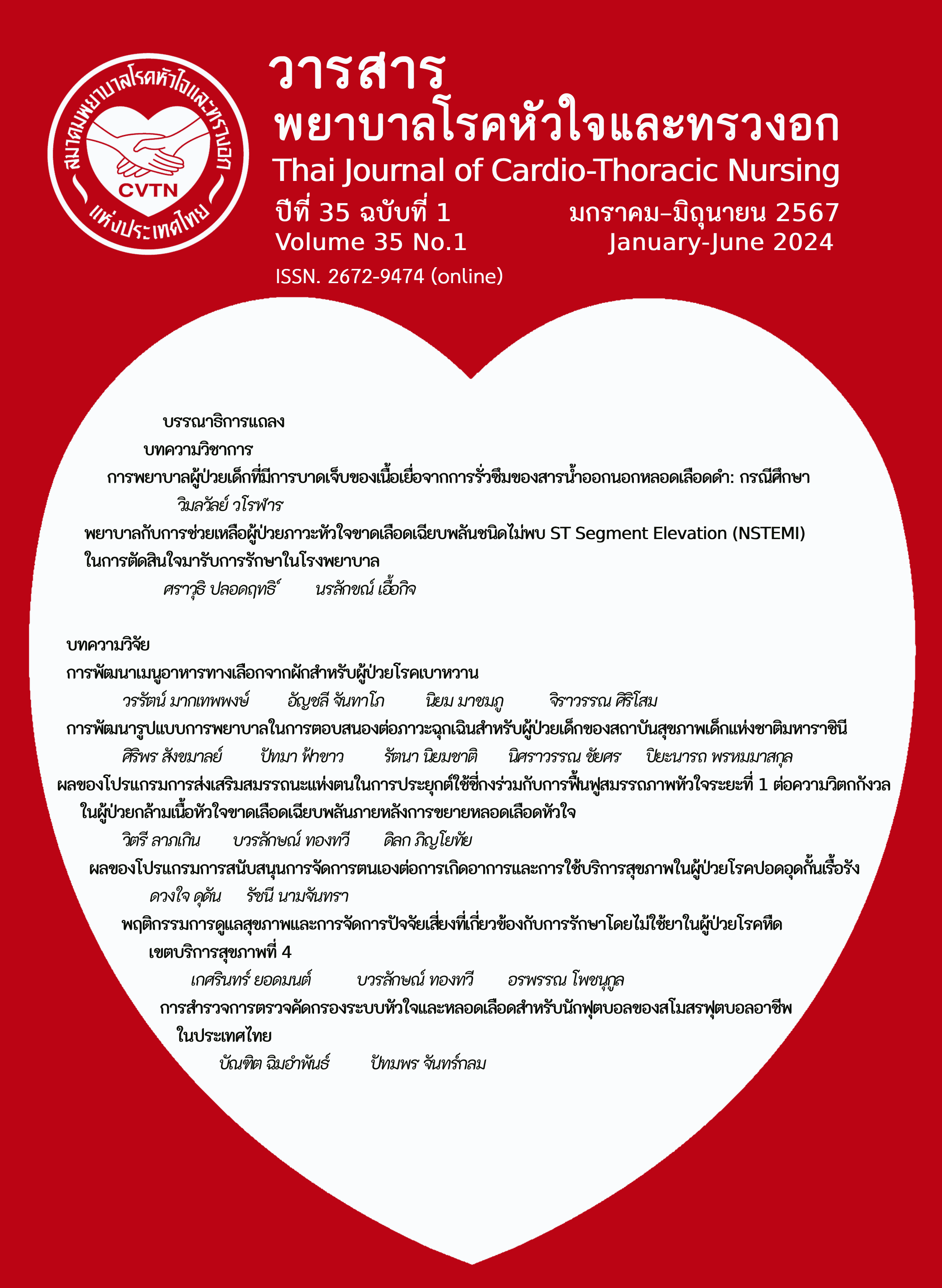ผลของโปรแกรมการสนับสนุนการจัดการตนเองต่อการเกิดอาการ และการใช้บริการสุขภาพในผู้ป่วยโรคปอดอุดกั้นเรื้อรัง
คำสำคัญ:
โรคปอดอุดกั้นเรื้อรัง, การใช้บริการสุขภาพ, การสนับสนุนการจัดการตนเอง, การเกิดอาการบทคัดย่อ
การวิจัยกึ่งทดลองแบบสองกลุ่มวัดก่อนและหลังทดลองครั้งนี้ มีวัตถุประสงค์เพื่อศึกษาผลของโปรแกรมการสนับสนุนการจัดการตนเองต่อการเกิดอาการและการใช้บริการสุขภาพในผู้ป่วยโรคปอดอุดกั้นเรื้อรัง กลุ่มตัวอย่างเป็นผู้ป่วยโรคปอดอุดกั้นเรื้อรัง ที่เข้ารับการรักษาที่ตึกผู้ป่วยนอก สถาบันโรคทรวงอก เลือกแบบเฉพาะเจาะจงตามเกณฑ์คุณสมบัติ จำนวน 60 คน แบ่งเป็นกลุ่มทดลองและกลุ่มเปรียบเทียบ กลุ่มละ 30 คน โดยกลุ่มทดลองได้รับโปรแกรมการสนับสนุนการจัดการตนเอง ส่วนกลุ่มเปรียบเทียบได้รับการดูแลตามปกติ เก็บรวบรวมข้อมูลโดยแบบสอบถามข้อมูลส่วนบุคคลและข้อมูลเกี่ยวกับการเจ็บป่วย แบบประเมินการเกิดอาการ และแบบบันทึกการใช้บริการสุขภาพ วิเคราะห์ข้อมูลด้วยสถิติเชิงพรรณนา Chi-square, Fisher’s exact test, และ Mc Nemar test
ผลการศึกษา พบว่าหลังทดลองกลุ่มทดลองมีสัดส่วนการเกิดอาการได้แก่ มีเสมหะ เสมหะเปลี่ยนสี ไอ หายใจมีเสียงวี๊ด มีน้ำมูก เจ็บคอ และมีไข้ ตลอดจนมีการใช้บริการสุขภาพน้อยกว่าก่อนทดลองอย่างมีนัยสำคัญทางสถิติ และมีสัดส่วนการเกิดอาการหายใจมีเสียงวี๊ดและการใช้บริการสุขภาพน้อยกว่ากลุ่มเปรียบเทียบอย่างมีนัยสำคัญทางสถิติ
การศึกษานี้มีข้อมูลเชิงประจักษ์ว่าโปรแกรมการสนับสนุนการจัดการตนเองช่วยลดการเกิดอาการและการใช้บริการสุขภาพด้วยอาการกำเริบของผู้ป่วยโรคปอดอุดกั้นเรื้อรังได้ จึงควรประยุกต์โปรแกรมการสนับสนุนการจัดการตนเองในการพยาบาลผู้ป่วยโรคปอดอุดกั้นเรื้อรังอย่างต่อเนื่อง
References
Global Initiative for Chronic Obstructive Lung Disease. Global strategy for the diagnosis, management, and prevention of chronic obstructive pulmonary disease [Internet]. 2019 [cited 2019 January 23]. Available from: http://www.goldcopd.org.
Ministry of Public Health. Department of Non-Communicable Diseases Control. 2023 [cited 2023 January 18]. Available from: http://wwwthaincc.com/2016/mimmion/cocuments-detail.php?-3d=14480&gid=1-020
Thoracic Society of Thailand under the Royal Patronage. Recommendations for the care of patients with chronic obstructive pulmonary disease. Bangkok: Beyond Enterprise Co., Ltd; 2017.
Lilly EJ, Senderovich H. Palliative care in chronic obstructive pulmonary disease. J Crit Care. 2016;27;35:150-4. Doi: 10.1016/j.jcrc.2016.05.019
Boonreung J, Suwanno J, Phonphet C, Petsirasan R, Thiamwong L. Predictors of chronic obstructive pulmonary disease severe acute exacerbation. Thai J Cardio-Thorac Nurs 2017;28(1):111-26. (in Thai).
Kamthong S, Supametaporn P, Juntarawijit Y, Factors predicting acute exacerbation in patients with chronic obstructive pulmonary disease. Nursing Journal 2019;46(1):126-36. (in Thai).
Halpin DMG, Decramer M, Cecramer M, Celli BR, Mueller A, Metzdorf N, et al. Effect of a single exacerbation on decline in lung function in COPD. Eur Respir J. 2017;128:85-91.
Kanfer FH, Gaelick-Buys L. Self-management methods. In: Kanfer F, Goldtein A. editors. Helping people change: A textbook of methods. 4thed. New York: Pergamon press; 1991.
Thanawong L, Nantachaipan P, Soivong P. Effects of a self-management promotion in pulmonary rehabilitation on functional capacity and health care utilization among persons with chronic obstructive pulmonary disease. Nursing Journal 2016;43(2):45-56. (in Thai).
Pipopsuthipaiboon S, Kengganpanich M, Kengganpanich T, Chuaychoo B. The Effectiveness of a Self-management Program for Pulmonary Rehabilitation of Patients with Chronic Obstructive Pulmonary Disease. Journal of Public Health 2017;47(2):200-11. (in Thai).
Jonkman NH, Schuurmans MJ, Groenwold RHH, Hoes AW, Trappenburg JCA. Idedtifying components of self-management interventions that improve health-related quality of life in chronically ill patents: Systematic review and meta-regression analysis. Patient Educ Couns 2016;99(7):1087-98.
Baker E, Fatoye F. Clinical and cost effectiveness of nurse-led self-Management intervention for patients with COPD in primary care: A systematic review, Int J Nurs Res 2017;71:125-38.
Cannon D, Buys N, Sriram KB, Sharma S, Morris N, Sun J. The effects of chronic obstructive pulmonary disease self-management interventions on improvement of quality of life in COPD patients. Respiratory Medicine 2016;121:81-90.
Yadav UN, Hosseinzadeh H, Baral KP. Self-management and patient activation in COPD patients: An evidence summary of randomized controlled trials. Clinical Epidemiology and Global Health. 2017;6(3):148–154.
Central Chest Institute of Thailand. Statistics of patients with chronic obstructive pulmonary disease. Nonthaburi: The Institute; 2021. (in Thai).
Wang T, Tan JY, Xiao LD, Deng R. Effectiveness of disease-specific-management education on health outcomes in patients with chronic obstructive pulmonary disease: An updated systematic review and meta-analysis. Patient Educ Cous 2017;100:1432-46.
Norwood SL. Research strategies for advanced practice nurses. New Jersey: Prentice Hall; 2000.
Wongderm A, Duangpaeng S. Factors influencing function performance among patients with chronic obstructive pulmonary disease. TPHSJ 2014;9(3):120-8. (in Thai).
Thoracic Society of Thailand under the Royal Patronage. Recommendations for the care of patients with chronic obstructive pulmonary disease. Bangkok: Beyond Enterprise Co., Ltd.; 2020.
Leidy NK, Kimel M, Ajagb L, Kim K, Hamiton A, Becker K. Designing trials of behavioral intervention to increase physical activity in patients with COPD: Insights from the chronic disease literature. Repir Med 2014;108(3):472-81.
Song X, Hallensleben C, Zhang W, Jiang Z, Shen H, Gobbens RJJ, et al. Blended self-management interventions to reduce disease burden in patients with chronic obstructive pulmonary disease and asthma: Systematic review and meta-analysis. JMIR 2021;23(3):1-9.
Downloads
เผยแพร่แล้ว
How to Cite
ฉบับ
บท
License
Copyright (c) 2024 วารสารพยาบาลโรคหัวใจและทรวงอก

This work is licensed under a Creative Commons Attribution-NonCommercial-NoDerivatives 4.0 International License.
บทความนี้ยังไม่เคยตีพิมพ์หรืออยู่ในระหว่างส่งไปตีพิมพ์ในวารสารอื่น ๆ มาก่อน และกองบรรณาธิการขอสงวนสิทธิ์ในการตรวจทาน และแก้ไขต้นฉบับตามเกณฑ์ของวารสาร ในกรณีที่เรื่องของท่านได้ได้รับการตีพิมพ์ในวารสารฉบับนี้ถือว่าเป็น ลิขสิทธิ์ของวารสารพยาบาลโรคหัวใจและทรวงอก






